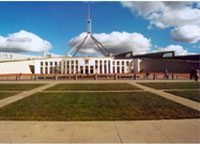Politics (Ext) - POLSC24053
Stream Summary
Faculty: ARTSC - Faculty of Arts&Social Science
School: School of Social Sciences
Contact: School of Social Sciences
Program: 4053 - Arts / Education (Secondary)
Award(s):
Bachelor of Arts (Minor)
View stream information for previous years
Stream Outline
The word ‘politics’ often causes people to think of politicians. Certainly they are important as we live in a democracy which is run by political elites. Elites, however, operate within a constitutional framework of institutions such as political parties, legislatures, courts and bureaucracies. And in a democracy political elites are elected by citizens, who can mobilize through social movements and protests and whose voices feed and resonate through the media, including digital media. Since the 1960s a range of new actors and issues have arisen, such as women, indigenes, ethnic and religious minorities, and libertarian groups. All of these actors compete over principles and policies that are articulated through ideas such as legitimacy, authority, obligation, freedom, equality, multiculturalism, human rights, justice, and democracy itself. In turn, political power is always engaged with other forms of power, from economic power to the power of governance structures.
Furthermore, politics doesn’t stop at our border. Australia is connected to the world and to globalization such that what happens in other countries directly affects what happens here. For that reason politics also needs to be studied in comparative and cosmopolitan perspectives.
Stream Learning Outcomes
- Explain understandings of the foundations of political institutions and actors
- Explain the development of political knowledge in connection with historical, philosophical and social perspectives
- Explain the contested nature and the problematic character of political inquiry
Stream Structure
You must complete the following Level 1 core courses:
You must complete the following Level 2 core course:
You must complete the following Level 3 core course:
- ARTS3841 Politics Capstone (6 UOC)
And 6 UOC from the following:
The following courses from other subject areas can also be counted towards the Politics extended minor stream:
- ARTS3788 European Governance (6 UOC)
- ARTS3814 Australian Foreign Policy (6 UOC)
- ARTS3816 US, China and Intl Law (6 UOC)









